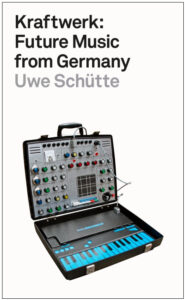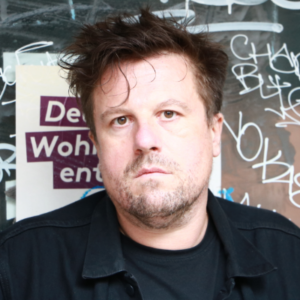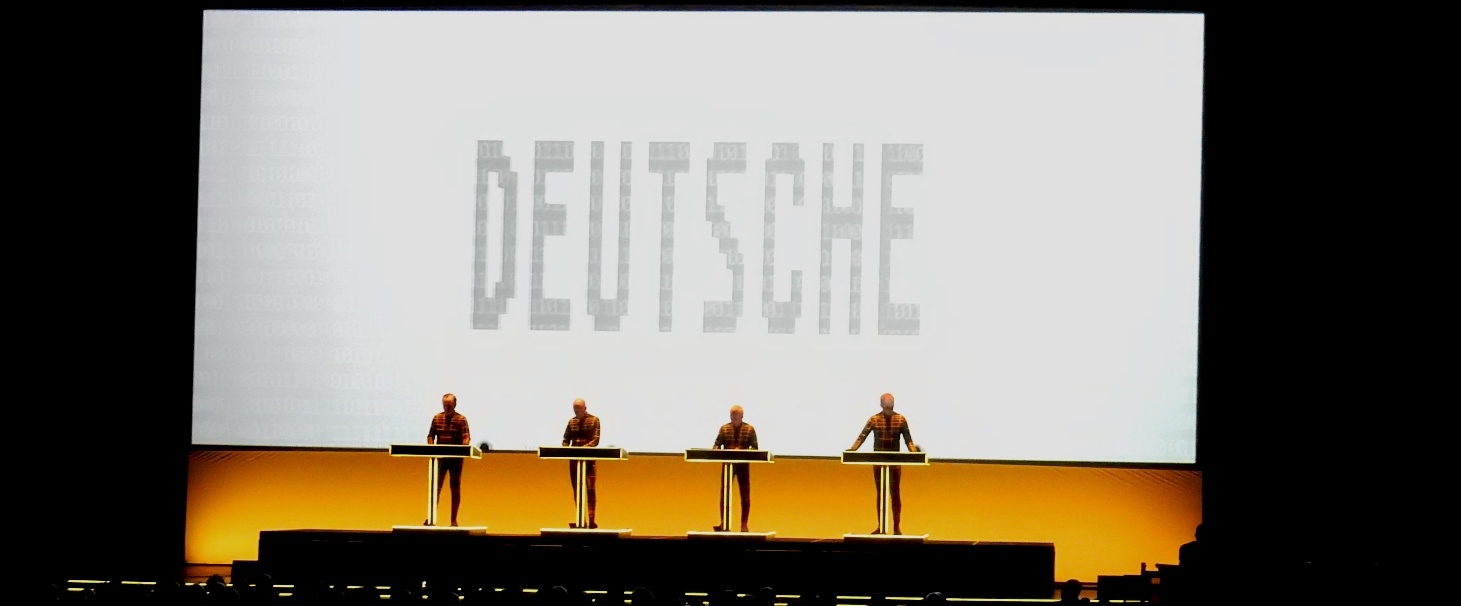 Uwe Schütte is a noted KRAFTWERK scholar who curated the first ever conference on the iconic German pioneers in 2015.
Uwe Schütte is a noted KRAFTWERK scholar who curated the first ever conference on the iconic German pioneers in 2015.
A Reader in German at Aston University in Birmingham where he teaches and researches contemporary Austrian and German literature, the writer W.G. Sebald and German popular music, in 2017 he compiled ‘German Pop Music: A Companion’, a 270 page book discussing the post-war musical landscape of the country and its influence internationally.
Published as part of the Penguin on Design series, his new book ‘KRAFTWERK Future Music from Germany’ offers a German perspective of die Kling Klang Quartett in English.
This is the story of Die Mensch-Maschinen as a cultural phenomenon told crucially from a local point of view. Of particular significance in Schütte’s premise is the context of how after the Second World War, Germany was divided in two with the atrocities it committed very much in the minds of its population. Frankfurt and Nuremberg were occupied by the US Army while in Der Rheinland, Düsseldorf itself had the presence of the British Army; it was within this context that KRAFTWERK emerged.
Schütte discusses how since the Second World War, young Germans are educated about the Nazi atrocities and The Holocaust with the emphasis on peace and prevention of further conflict. Compare that to the British attitude to recent history where heroism and bravado are celebrated with war monuments, where Oswald Mosley, the leader of the British Union of Fascists is considered a flawed man of the people (see the ‘Not The Nine O’Clock News’ song sketch from 1980), Edward VIII is seen as the king who gave up his throne for love rather than as the spying Nazi sympathiser he actually was and British Empire inventions such as the concentration camp are conveniently glossed over.
With a desire for a new Germanic cultural identity ignoring Trans-Atlantic rock traditions, KRAFTWERK fused sound and technology, graphic design and performance, modernist Bauhaus aesthetics and Rhineland industrialisation to conceive a Gesamtkunstwerk or “synthesis of the arts” that was to change the course of modern music.
Düsseldorf is just half an hour to Belgium and The Netherlands, and an hour to Paris so an accessible spirit of cultural adventure was to manifest itself in the creative minds of Ralf Hütter and Florian Schneider, thanks to their location and education. ‘Autobahn’ and ‘Trans Europe Express’ were deep inside their psyche, while ‘Europe Endless’ was forward thinking despite its nostalgic romanticism and dreamt of a continent without borders that supported a vision of peace and unity.
KRAFTWERK’s role as cross-cultural ambassadors was not just restricted to Europe, as urban America in particular embraced their vision and adapted it to their own forms as they became the bridge between electronic pop and dance music, having already straddled a line between improvisation and pop.
But while KRAFTWERK had been assertive in confronting and reclaiming aspects of Germany’s past, they could be vague when looking at their country’s more immediate future. One interesting aspect is Schütte’s account of how KRAFTWERK upset the powerful anti-nuclear lobby in Germany with their ambiguous lyricism on the song ‘Radio-Activity’ when originally released in 1975. The band did not help their situation by having promotional images photographed in atomic power installations.
But in 1991, KRAFTWERK reworked the track for ‘The Mix’ to contain an explicit anti-nuclear message to “STOP RADIOACTIVITY” while also highlighting the tragedies and disasters in Chernobyl, Harrisburg, Sellafield and Hiroshima; it was then updated in 2012 to mention Fukushima as part of the ‘No Nukes’ event in Japan put together by Ryuichi Sakamoto.
The artistic tensions that have led to Ralf Hütter remaining as the sole member from the classic RFWK line-up and KRAFTWERK effectively stalling as a creative force musically are given a positive slant by Schütte, despite only one album of new material appearing since 1986’s ‘Electric Café’ / ‘Techno Pop’ adventure.
A music paper once wrote about KRAFTWERK’s music “it’s good but is it rock and roll?” – well, of course it isn’t, THAT’S THE POINT! While KRAFTWERK have been less than productive on the new material front, they have continued their pursuit of modernism in the spirit of the Bauhaus movement, unifying art and technology, pushing forward innovations in 3D visuals and surround sound.
KRAFTWERK have certainly not done anything like going backwards to allow the turgid interference of drums and guitars to dominate their live sound in the way DEPECHE MODE have in their desperate attempts at validation from the predictable narrow-minded standpoint of the rock community. When Ralf Hütter was once asked by a British journalist whether KRAFTWERK songs could be played on an acoustic guitar, he gave the question the disdain it deserved and wryly replied “I play keyboards!”?
KRAFTWERK are the ultimate anti-rock icons. To that end, if they were to be inducted into The Rock & Roll Hall Of Fame, it would destroy everything their cultural legacy as pioneers of electronic music has established and make them just another boring rock band.
Uwe Schütte talked about what makes ‘KRAFTWERK Future Music from Germany’ unique, as well as how he believes the band’s legacy and future will play out.
There are already books on the history of KRAFTWERK, by Pascal Bussy, Tim Barr and David Buckley, among others, why does the world need another?
Yes, the three KRAFTWERK B-boys, as I call them in my book… Well, the books might share the same topic, but are all very different. Barr’s book is outdated, Bussy’s too. Buckley’s book does not use the many available sources in German, for example. And he focuses less on the performance history aspect. It is a very good book, but written by a British person for a British reading audience. My book translates the German cultural phenomena that is KRAFTWERK for an Anglophone readership.
Your book has a focus on design and image?
That is another distinguishing feature of ‘Future Music from Germany’. I treat KRAFTWERK as a Gesamtkunstwerk, a total work of art that exceeds music and performance and also incorporates the visual dimension: from the cover designs to today’s complete audio-visual package at the 3D concerts.
As borne out by the back photo on the original German Philips release of ‘Autobahn’, KRAFTWERK had long hair but had it cut short for the concert tour. How and why did this come about?
Ralf Hütter wanted to give KRAFTWERK a more sober, cleaner image, to distance the band from received notions of how a rock band should look and sound.
ELECTRICITYCLUB.CO.UK rather likes the vintage suit look of ‘Trans Europe Express’. Which image was your favourite?
I love it, too, and discuss how I first saw the poster of the band members sitting at an outdoor café in their conservative attire in the book. I found it truly odd.
How important was Emil Schult’s graphical and musical contributions to the band?
Very, very important. And much underrated. I try to put the record straight.
You make an interesting observation as to how the original German lyrics to the ‘Computerwelt’ title track are more complex and sinister in their now timely observation of how data is being used and manipulated, compared with the simplified almost nursery rhyme take in English?
Yes, it is important to me to alert English-language readers to the differences between the two languages. I listened to KRAFTWERK singing in German for almost 40 years. They were essentially the only band using my native language – as a German, I equated pop music with English lyrics.
The reissues that made up ‘Der Katalog’ boxed set were quite revisionist on many levels. Was this necessary or an enhancement of the legend in your eyes?
Very necessary, albeit not perfectly done. I discuss KRAFTWERK as an ongoing, evolving art project, and the design changes were an important update of the Gesamtkunstwerk.
There were all the stories of Wolfgang Flür being written out of ‘Der Katalog’, but of course the irony is that Wolfgang’s face was cropped onto the face of Emil Schult for the back photo on the original German Philips release of ‘Autobahn’…
Yes, nothing new there. Karl Bartos was essentially eliminated from the oeuvre, too. But, although this is a dubious move on a moral level, it is a great improvement on an artistic level: the KRAFTWERK concept is all about eliminating personal, individual factors and foregrounding man-machine qualities.
If you read between the lines though, it would appear that Wolfgang Flür hasn’t actually contributed to a KRAFTWERK recording since 1978?
True, but he was important, as was Emil Schult, in various aspects that contributed to the success of the band project. My book, however, is little concerned with gossip or the human frailties or personalities issues at stake. The other books take care if that. As an academic, my interest lies in the conceptual ideas that dominate KRAFTWERK: the notion of the man-machine, the idea of the robot as its avatar, the Gesamtkunstwerk concept and such like.
What was your take on how Karl Bartos and Wolfgang Flür approached their autobiographies?
Well, I took next to no info from Flür’s book and quoted Bartos’ a few times concerning technical and musical info, on which he is very good indeed. I definitely preferred Bartos’ book.
As far as maintaining their own parts of the KRAFTWERK legacy, Karl Bartos at least performs his KRAFTWERK co-writes alongside his new compositions live, but Wolfgang Flür peddles that rather tedious ‘Musik Soldat’ DJ set accompanied by a Powerpoint presentation. Do you agree?
To be honest, I haven’t seen either show so far. I prefer to go to KRAFTWERK concerts, to be honest. I liked the ‘Off The Record’ album, though.
Karl Bartos was KRAFTWERK’s Alan Wilder, discuss…
True. Next question.
Do you think KRAFTWERK’s refusal to collaborate with other musicians (eg Michael Jackson) has been a hindrance or help to the band?
Provided the rumour re Michael Jackson is true at all… Bowie certainly looked for cooperation, and I am pretty curious about how the music they would have made would have sounded… but ultimately it was of course the right decision to turn down all offers and stay strictly true to the concept.
How much longer do you think KRAFTWERK can continue with their 3D / graphics based show? The template for this has been in place for over 15 years now…
Hopefully still for many, many years. As soon as Hütter won’t be able to perform for health reasons, the game will be over anyway. What I am truly curious about is which, if any, precautions he has taken to ensure the KRAFTWERK project continues beyond that point. Maybe a permanent exhibition of the “musical paintings” at a museum?
What still drives Ralf? Surely he could rest on his laurels and appreciate the band’s legacy?
Florian Schneider’s departure in 2008 was the best thing that could have happened to KRAFTWERK. It gave Ralf Hütter the opportunity to start touring extensively and to take their amazing show to as many people as possible. The man-machine concept only comes alive if KRAFTWERK perform their shows on stage. Admittedly, I begin to tire of it a little, having now seen it some 15 times or more, but everyone who sees it for the first time is blown away, and rightly so!
We now live in a technological era of the virtual pop star eg HATSUNE MIKU + GORILLAZ… can you see a time when Ralf and co “retire” and send robots out on tour instead of them?
No, not really. Though I would go and see it, for “professional reasons”, as it were, it would not really interest me.
KRAFTWERK were left behind musically and technologically a long time ago. Is there anything you can see the band doing to help reclaim their crown in this era or has that time come and gone now?
This question excludes the crucial and decisive visual aspect. KRAFTWERK are still at the forefront of music: There is hardly a better electronic music concert experience around than their 3D audio-visual package with the full wave-field synthesis sound system. I went to see MODEL 500 recently in Berlin. They are proof that Detroit techno is well past its prime. And a cheap KRAFTWERK performance imitation.
If KRAFTWERK did release an album, what concepts could they possibly use in it? There was a rumour a few years ago about a bio-fuels theme…
Ah, interesting, I hadn’t heard that rumour. I speculate about themes such as AI, genetic manipulation and other post-humanist ideas that would fit with the robot and man-machine concept. But all of this is idle speculation. What I hope for, though, is another EP in the vein of ‘Expo 2000’… Or some officially approved remixes, like the ones by HOT CHIP.
You have this theory in the book that there will never be a new KRAFTWERK album because of the magic number 8?
And it is very convincing, don’t you agree? And what is even more convincing is the fact that Hütter, even if aided by Fritz Hilpert, would not be able to pull off the feat of making an album full of exciting new tracks that would exceed, or even match the existing ones.
Why do you think Ralf appears to distance himself from the first three KRAFTWERK albums so much, to the point where he sees ‘Autobahn’ as a “year zero” for the band?
Yes, of course, it is part of the myth, though Florian Schneider was no different.
 What are your opinions on RAMMSTEIN’s version of ‘The Model’?
What are your opinions on RAMMSTEIN’s version of ‘The Model’?
Don’t get me started. I hate it, and I hate RAMMSTEIN, not because of their sh*tty music, which I am not bothered about, but because their records and videos promote nationalist political thinking in Germany. The band purposely encourages right-wing agendas.
I am not fussed about people abroad liking the music, or even thinking that the Teutonic clichés these millionaire musicians peddle have anything to do with Germany or German culture.
KRAFTWERK have once again been overlooked at not inducted into The Rock & Roll Hall Of Fame. Do you have an opinion on this?
Yes, I do: It is a disgrace.
ELECTRICITYCLUB.CO.UK gives its warmest thanks to Uwe Schütte
Special thanks to Matt Hutchinson at Penguin Music
‘KRAFTWERK Future Music from Germany’ by Uwe Schütte is published by Penguin Press, available from all good book retailers
http://www.aston.ac.uk/lss/staff-directory/schutteu/
Text and Interview by Chi Ming Lai
Additional Questions by Paul Boddy
27th February 2020


Follow Us!